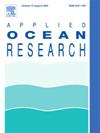Control co-design for wave energy systems
IF 4.3
2区 工程技术
Q1 ENGINEERING, OCEAN
引用次数: 0
Abstract
Control co-design (CCD) has become a powerful paradigm in the total optimisation of the dynamics of a system against a defined performance goal. Given the impact of control on wave energy systems, including significant effects on motion and energy capture performance, it is imperative that controller and system are optimised together to maximise (economic) system performance. There are a number of design aspects that can usefully be addressed by CCD in wave energy systems, including device geometry, mooring configuration, power take-off (PTO) parameters, and array layout. A number of these design aspects present significant computational challenges and, as a result, wave energy CCD studies typically address a single design aspect at a time. This paper examines the useful roles that CCD can play in wave energy systems, important criteria to consider, and the potential interaction between individual wave energy CCD aspects.
波浪能系统控制协同设计
控制协同设计(CCD)已经成为一个强大的范例,在一个系统动力学的总体优化,以确定的性能目标。考虑到控制对波浪能系统的影响,包括对运动和能量捕获性能的重大影响,必须同时优化控制器和系统,以最大限度地提高(经济)系统性能。在波浪能系统中,CCD可以有效地解决许多设计方面的问题,包括器件几何形状、系泊配置、功率输出(PTO)参数和阵列布局。这些设计方面的许多方面都提出了重大的计算挑战,因此,波浪能CCD研究通常一次只解决一个设计方面的问题。本文探讨了CCD在波能系统中可以发挥的有用作用,需要考虑的重要标准,以及各个波能CCD方面之间潜在的相互作用。
本文章由计算机程序翻译,如有差异,请以英文原文为准。
求助全文
约1分钟内获得全文
求助全文
来源期刊

Applied Ocean Research
地学-工程:大洋
CiteScore
8.70
自引率
7.00%
发文量
316
审稿时长
59 days
期刊介绍:
The aim of Applied Ocean Research is to encourage the submission of papers that advance the state of knowledge in a range of topics relevant to ocean engineering.
 求助内容:
求助内容: 应助结果提醒方式:
应助结果提醒方式:


